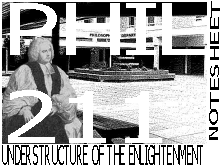 Locke 3
Locke 3  Locke 3
Locke 3 This table is a particular; the concept table is a general concept.
' How can any of our thought become general in its nature, when experience is itself irremediably particular?' (Scruton, A Short History of Modern Philosophy, p.90.)
Abstract ideas are derived from simple ideas through an operation of the mind called by Locke 'abstraction'.
The great run of our thoughts involve categories.
Roger Scruton (A Short History of Modern Philosophy, London, 1981, Routledge, p.90) : experience is irremediably particular. How does the empiricist account for this?
"For the present I shall not discuss the question whether genera or species really exist or are bare notions only; and if they exist whether they are corporeal things, or incorporeal and rather separated , or whether they exist in things perceived by the senses and in relation to them. For these questions are profound and demand other and more acute examination." Commentaria in Aristotelem Graeca ed. A.Busse, iv,I,II,8-13. Quotation taken as it appears in R.I Aaron, TU, p.1.
The question suggested and taken up by medieval philosophers was the question of the existence of categories.
There are categories and they are the 'things' which populate the World of Ideas.
Categories are 'the workmanship of the understanding'. What our sense experience provides us with are lots of ideas of individual things. My 'understanding' generates a category out of a number of ideas of individual things by identifying all the component ideas which the ideas of individual things have in common. This collection of ideas which are common to all the ideas of individual things that my understanding is considering constitute the 'essence' of the category I am in this way constructing. (He calls this its 'nominal' essence.) What is his answer to Porphyry's question of whether (and in what sense) those categories exist?
In saying that our understanding constructs them, Locke is making the point that in his view there aren't any Scholastic forms. There aren't forms in this sense, and the appearance the things we observe present to us of existing in limited variety is not due to there existing a limited number of forms.
What is it due to then?
Locke's answer is that it is due to the 'atomic' constitution of things.
(Locke's view has therefore nothing to do with the notion that human beings can construct whatever sorts they like.)
Maybe: how can we program a machine to handle categories with human sophistication?
VP